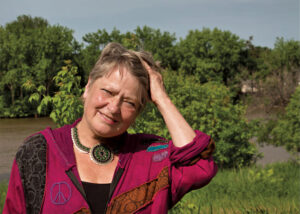“Canadian Mennonite provides a vital service by keeping the congregations informed on church life issues and trends. It has a good balance on raising cutting edge questions.”
This is only one of the 442 (mostly positive) comments on how this publication is fulfilling its mission from the results of a recent independent readership survey. We want to thank everyone who participated in the survey, all 1,221 of you, which represents, according to our survey analyst, a phenomenal return at more than 10 percent of the total. Most surveys of this nature get a 3 percent return; 7 percent is considered exceptional.
Full survey results will be reported in a later edition. But first, we’d like to point out some parallels between who our readers are and what they said in answering our 42 questions and what we observe are the demographics and viewpoints of our 220 congregations across Canada.
Not surprising are the demographics of those answering. The largest group responding was age 66 and older. They are well educated with an above-average income. Doesn’t that track pretty well with the average congregation across Canada? We are an aging denomination—a generation that is well-informed and living a comfortable life.
This group does not see Canadian Mennonite as “owned” by Mennonite Church Canada, but by the congregations. While this is not only very true, it is interesting that the notion of some “independence” is understood by our main readership. While we are supportive of MC Canada and receive funding from it and the five area churches, we are free to critique and treat them as one voice of many across the church.
This older group sees us as a source of information about the congregations and a place to connect. This same group sees our purpose as “spiritual and inspirational.”
The 25- to 65-year-olds see us a place to challenge and discuss ideas. They discuss these issues mostly in personal conversations, rather than from the pulpit or in other leadership discourse.
Isn’t that what happens at the congregational level, too? Don’t we come to church to feed our souls spiritually, to receive inspiration for our home/work/community lives during the week? Don’t we look forward to connecting with our friends who, in large part, form our networks of small care groups and book clubs? Isn’t this where we experience “community” like in no other setting?
In that sense, we are in sync with life at the congregational level and are hopefully enriching our collective spiritual lives together. The magazine is said to be read from “cover to cover” by the 66-plus year-olds, while the younger age groups “skim through it quickly” and then read it more thoroughly later. “Overall, the magazine is well read,” says our analyst, and also well liked.
Isn’t that true in your congregation, too? The older group, many of whom are retired, take the time to absorb most of our content, while the younger group, busy with home, school and work, are more selective.
Most readers feel that while our current content is good, they are not looking for devotionals or information from leaders. They want it to maintain a “news feel.” What does that say about our congregations? “Is community” more important than preaching and worship? Or shall we say that gathering and friendship are just as important as spiritual formation?
While there is a “very low engagement level online,” according to our analyst, there is strong sentiment to keep the printed version of Canadian Mennonite. This is a surprising response, given that we have worked very hard in the last two years to beef up and improve our website. This response needs to be nuanced, however, because the number of responses were small from the younger group compared to those of the older group.
What the younger demographic wants to see, however, is striking. They are “very interested in more Christian and theological teaching in response to issues.”
While web survey respondents enjoy the discussion and letters, they want some “theology” to go along with it. This was the only group to articulate the desire for a stronger Anabaptist presence; others wished for more theological views, some from leaders, but not exclusively.
Finally, what does this say about what the age 45 group wants? Is there a yearning in our congregations, too, for more Anabaptist teaching, more wrestling with the issues from the perspective of our spiritual roots?







Leave a Reply
You must be logged in to post a comment.